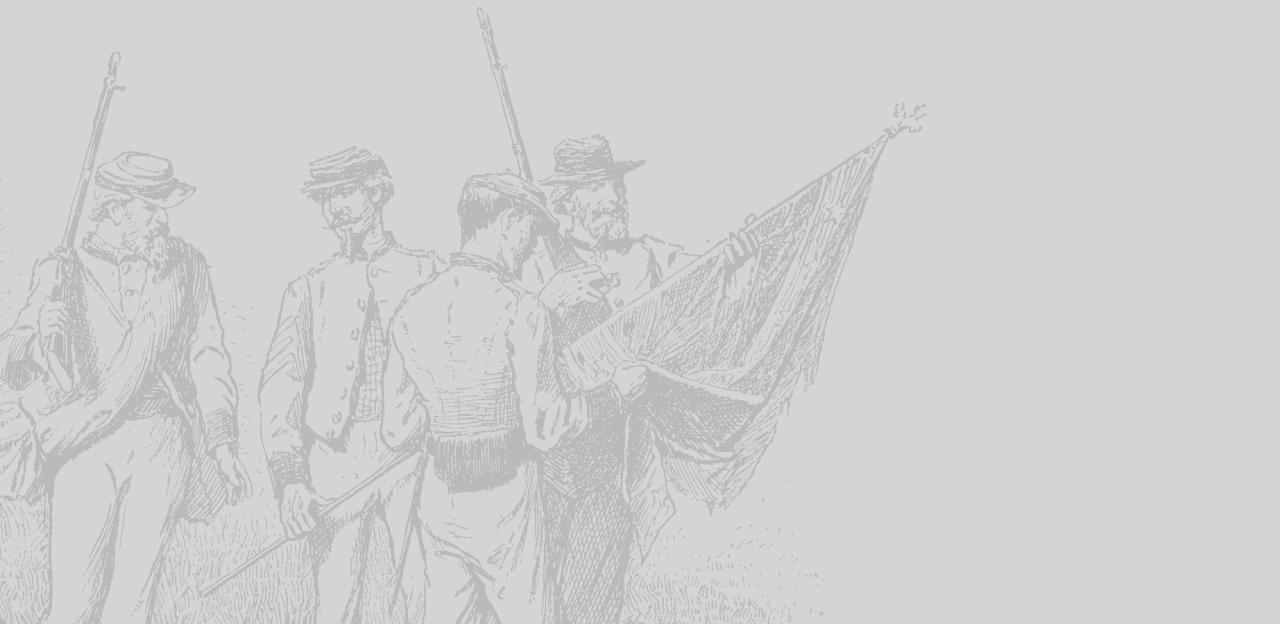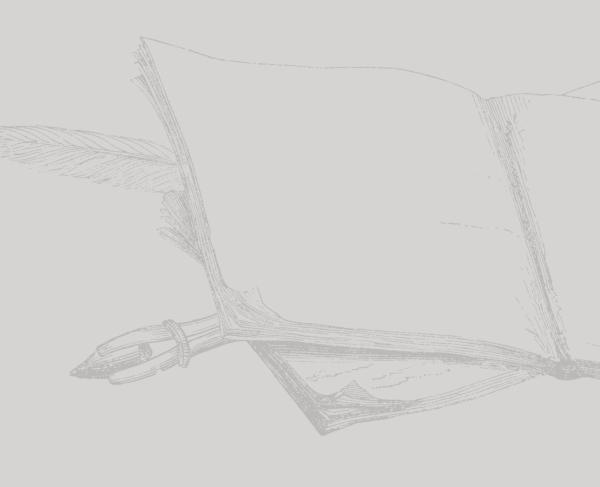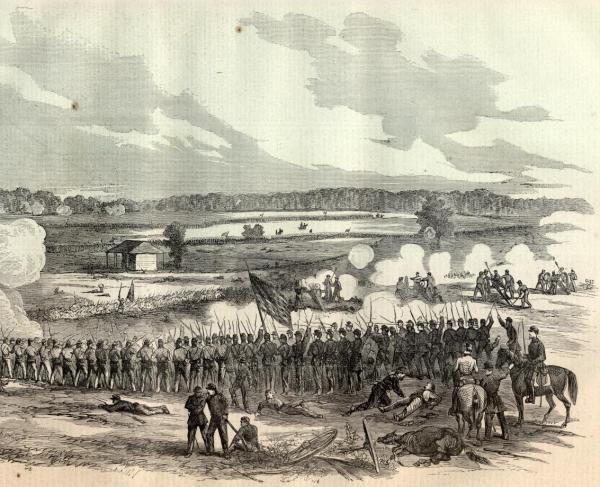An Ohioan in the Slaughter Pen

Corporal Wesley S. Poulson of the 98th recalls his experience at the October 8, 1862 Battle of Perryville, Kentucky. Paulson's regiment was positioned in the bloodiest portion of the battlefield during the climactic struggle for the Dixville Crossroads.
We had not gone far when the roaring of cannon was heard distinctly and I knew that something shortly was to be done either in the way of fighting or running. A few of the boys began to get sick when we heard the sound of the cannon, but most of them seemed to walk with more ease, as if there were springs in their legs. Every mile we advanced the more distinct became the sound, and the more frequent also. As we neared the field we met many citizens, male and female, old and young, leaving the neighborhood for fear they would get hurt. Most of them seemed much excited, some shouting for joy at seeing our division, and others crying at the thought perhaps, of their homes being taking as the battleground, their houses destroyed, their stocks killed, etc. The people of Ohio as yet have had no such trials such as these poor women and children had at that time, but the; have no surety that such a day will not come. Between 12 and 1 o'clock we came in sight of our battery which was at that time engaged. I looked in the direction they were firing but could see no rebels. I could see the, smoke of their battery rising above the trees but the leaves were so thick we could not see a man. The battery was nearly a mile from ours at that time.
The ridge which upon our line was being formed extended nearly north and south. The rebels were east of us on another ridge. When we got to the top of the ridge we were ordered to file right and we went southward along the ridge some two or three hundred yards when we filed left into a piece of woodland. There we received orders to pile our knapsacks and set a guard over them. We were then taken back nearly to the road we had come up and there filed left into a cornfield. The corn was in the shock. After loading our pieces we were ordered to rest. While we were in this cornfield the firing became more rapid - several other batteries were opened on each side and it seemed that the rebels were trying to get up farther north so as to turn our left flank.
This was rather a serious position to occupy, for we were looking to see a messenger for an order for our regiment to fall in line of battle. At about half past two as near as I can guess we saw Colonel Webster's aide coming in rather in an exciting manner. He had lost his hat by some means, and his hair was flying as he came riding onto Lt. Col. Porman. We readily guessed his errand, and were soon marching towards the scene of carnage. I can not now say how the rest of the boys felt about that time, but I know my heart was beating more rapidly than common, and I think theirs were too.
We soon found that we were intended to support Captain Harris' battery. Five other companies of our regiment were put to the right and five to the left of this battery, which consisted of four rifled 12 pounders. We were then ordered to lie close to the ground until we got further orders. We had seen no rebels yet. We knew they were near though, for the shells were bursting around, and solid shot was making the soil fly near us.
We saw before we had been lying long in that position, a swarm of rebels come out of the woods about half a mile in front of us. When they got into open land and lines dressed they started on double quick shouting and hollering like wild men, thinking I suppose to scare us and make us run, but it had the opposite effect and only made us grasp our rifles more firmly. About this time the musketry was brought into action by both sides by regiments that were coming into contact. Our battery kept them back from us for a considerable while, and during this time the shells, solid shot, and rifle balls were flying over us. Some high up in the air and some so low as to occasionally make us strike the ground with our noses. One shell burst in the air I suppose some 30 feet above us and a piece of it or some of its contents went into the ground about 15 inches from my head A cannonball passed over my back which I'm quite sure would have struck me had I been standing up. I thought when I heard it coming that it would strike my head. I shut my eyes expecting to feel it, but had the pleasure of hearing it whistle over me and afterwards saw the dust fly to the rear of our company some distance. Some of the boys were sleeping not withstanding all the noise that was being made. For my part I could not sleep. There was too much to be seen and the prospect of too much to be done for sleep to bother me.
To our right was the regiment which was engaged and I could see their men fall, some to rise no more, and others to be carried away by their comrades. I could plainly see the blood on some of them as they were carried back to the surgeon. I could see the rebel's flag on the next hill and occasionally the heads of the rebels when they would rise to shoot at the regiment mentioned They however took good care to hide their bodies and their heads are so little that they are rather difficult to hit.
I saw horses without riders running for life. I saw hogs, pigs, and rabbits, all running towards our line scared to insensibility almost by the advancing rebels. To our right a few hundred yards was a barn that had been fired by a shell from the rebels after they had made several attempts to fire it with a torch and the torchbearer shot before he got near it, one of whom was mortally wounded threw the torch towards the barn, but had not power to send it far enough to execute his wish. Their object was to throw our men into confusion, for the barn was just in our line and could not be burned without troubling our men considerably.
They finally concluded to make a charge on our battery. Their sharp shooters were deployed in advance of the column some 40 to 50 yards, for the purpose, I suppose, of "picking off" our commanding officers, so we could not have the benefit of their commands and the conflicts which they expected would follow.
To make the capture of our battery doubly sure they sent a regiment to flank ours on the right. The flanking regiment kept behind a hill from us and we were entirely unconsciousness of this movement until they were opposite the right wing of our regiment. During this time we were watching the line in front of us. It was a grand sight to see. The line was composed of some of Bragg's best disciplined troops. The men kept in excellent order, and when our battery would belch forth solid shot or shell at them, the line would fall as if all the men were linked together. As soon as the shot or shell struck they would rise at a word from their commander, and march forward till they again would see the smoke and again prostrate themselves to the earth. They seemed not to notice a man killed and wounded, but boldly marched on leaving them behind, and keeping their ranks well closed They were marching down a declivity and we could plainly see the killed and wounded left behind. One shell burst in their line that killed and wounded at least 12 men. This shell was fired just after they arose and I suppose they did not like to lie down and get up more than once in the same place. The line moved on and there on the hillside was a little lot of rebels still in death and others rolling in agony caused by their wounds. Rebels as they were, and deserving death as they did, the sight truly made me feel for them and I had not known their object in coming towards us, I should really have pitied them. This all took place in less time than it has taken me to write about it.
When Lt. Col. Porman first saw the regiment which was flanking us he called for attention and we instantly sprang to our feet. We were now facing eastward towards the advancing line of rebels. We were ordered to "right face, forward march" and then to "file right". This placed us with our left flank towards the advancing line (which was now ascending the hill on which our battery was placed) and I faced toward the regiment that was flanking us. Firing now commenced on both sides. One of Company F was struck in the first fire, the ball striking him in the face just below the left eye. Seeing his face so covered with blood and hearing the mournful noise he made seemed to strengthen my nerve till I felt revengeful.
We were within 80 or 90 yards, I think, of them. I shot three times from this place and then moved to where the company had gone, which was some 50 yards. They received orders for this move which was made on "double quick". I thought they were running from the rebels and would not go until I saw the Captain make a motion with his hand for me and three or four others to come on. On the way to them I halted long enough to take aim and shoot once and then reload my rifle and when I got to them I shot the fifth and last time. I think I was not more than 50 or 60 yards from the one I shot at last. He fell, but whether I or someone else hit him no one could tell.
We were here formed into a line having been thrown somewhat into confusion by the excitement of the movement. Orders were given to march forward and marching as near as I can guess some 30 yards, just as I was making a step with my right leg, it was struck about three inches below the knee joint with a large rifle ball instantly shattering both bones. I set my rifle down very quick to keep me from falling and with it hopped it out of the way so as to let the rest of the regiment pass. Then I laid down, and it so happened that near where I was stood a stump. I lay down by this with my head toward it so as to bring it between me and the line of advancing rebels who were now firing rapidly at us. It was fortunate for me a rail pile between me and the regiment that had flanked ours. I heard several balls strike the stump and heard the splinters knocked from the rails but received no further injury myself.
I made no noise when shot, of which I am consciousness, and got out of the ranks so quietly that no one knew what had become of me, and when the Captain that night asked for Poulson, no one had anything to say but that he was missing.
After the regiment passed me I saw no more of it for two weeks when they came back from Crabb Orchard. I then saw it pass the hospital which was the last sight I ever got of it. In less than five minutes after I was wounded the rebels were all around me shooting at the Union men. One shot several times off the stump by which I lay. His gun rested on the stump with the barrel extended over me having bayonet fixed and gleaming, and had I made signs of life he perhaps would have used his bayonet on me. When he had fired a few times, our men (a Regiment of Illinois, I think) made them run and then came down as far as where I lay. I told the boys to "give them fits". They replied they would and then wanted to carry me off, but I refused to let them, saying to them use your guns and let me alone.
As soon as the rebels ran, I cut the string off my canteen and tied it around my leg so as to stop the blood from flowing so freely, and I have no doubt but some other boys might have saved their lives by the same means. I believe in a half an hour longer had I not done this I would have lost so much blood that death would have followed shortly. In a few moments our line was driven back and the dirty, greasy, rebels were again around me. This time the most of them passed me and when up near our line, and it seemed to me as if the firing was all at the same place the lines were so near to each other. Some of the rebels were afraid to go near and hid behind trees, bushes, and whatever was near. The rebel color bearer came up opposite to where I lay and within about 20 feet of me. He there placed his staff on the ground and remained, I suppose some 20 minutes in that position. He was a portly looking man and better clad than most of the rebels were. Many of them were barefooted, hatless, and without a coat, and their shirts and pants seemed considerably worse for wear' and tear. The most of them, however, were well supplied that night by robbing the dead "yankees" as they call them.
The dead and wounded that I could see were considerable mixed and about this proportion: 1 Union man to 3 rebels. The rebels were on this ground near me longer and lost more men there. One large fat rebel fell near me that had a furrow made along the top of his head from front to back by a rifle ball, and the jar he received when he fell caused the brain to protrude the entire length of the furrow. I never saw him stir after he fell. His head was within a yard of my feet.
Night came and the storm ceased I could still hear noise enough made by the wounded of both sides.
Related Battles
4,211
3,401

